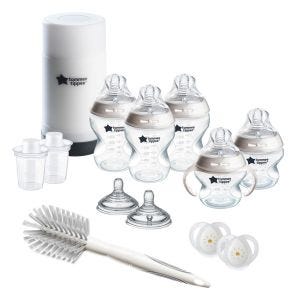
This is a demo store. No orders will be fulfilled.
Subscription orders can be cancelled at anytime. Free delivery on all subsequent subscription orders. Find out more about subscriptions.
They’re easy and fuss free
Your products are automatically sent to you
You save up to 10% when you sign up for a subscription
You can cancel at any time
It's often during the first trimester that pregnant people encounter some of the most challenging pregnancy symptoms. This means that although it's an exciting time that's crucial for the development of the fetus, it can also be tough.
We've written this guide to help you learn about the most common first-trimester symptoms. We'll also cover some top tips, and answer some of the most-asked questions that parents-to-be have about early pregnancy.
The first day of your last period marks the first day of the first trimester. It ends on the last day of the 12th week of your pregnancy.
Three trimesters make up a pregnancy. After the first trimester, you move into the second trimester, then the third trimester.
During the first trimester of pregnancy, a lot of changes take place in a person's body.
The fertilized egg implants itself in the uterus, and the placenta starts to develop. Hormones like progesterone and estrogen begin to increase, causing symptoms like fatigue, nausea, and breast tenderness (we'll cover those next). The baby's major organs and body systems also start to form.
Throughout the first trimester, lots of changes happen. While each pregnancy is unique, lots of people experience the same set of pregnancy symptoms. These are caused by both hormonal and physical changes, and include:
Although you'll experience lots of physical symptoms and changes in the first trimester, you might not notice a baby bump developing until around week 10.
While some people may see a visible pregnancy bump by the end of their first trimester, others may not. It just depends on your body and your baby's development. It's worth keeping in mind that everyone's pregnancy experience is different.
During the first trimester fetal development starts with the egg being fertilized and ends when the fetus has all its organs, and its body systems are developing. By the end of the first trimester, the fetus is about the size of a peach!
The truth is, some of the symptoms you experience during the first trimester can be unpleasant, but all the common symptoms of early pregnancy that we've mentioned above are normal and act as signals that your first trimester is going to plan.
On the other hand, you may feel great and not experience these common first-trimester symptoms. If that's you, don't worry. If your medical appointments confirm that everything is ok with your pregnancy, then there's no need to worry.
Some symptoms can sometimes be warning signs during pregnancy, and you should seek medical advice if you experience any of the following:
As previously discussed, the first three months of pregnancy can be an exciting time, but they can also be tiring and sometimes difficult. Therefore, it's crucial to focus on taking care of yourself and doing what is best for both you and your developing baby.
Your antenatal appointments with your healthcare team are important. They allow them to check on the health of you and your baby, give you useful information, and answer any questions you may have along the way.
Once you find out that you're pregnant, you should take prenatal vitamins that make up for any nutritional deficiencies during pregnancy. These include folic acid, calcium, and iron supplements.
You should check with your pharmacist or doctor that any medication you're planning to take is safe to use during pregnancy before you take it. This includes anything prescribed by a doctor or purchased from a pharmacy or store, including painkillers.
While it's ok to give in to your candy craving during pregnancy, it's important to stay hydrated and eat a balanced diet to support your baby's growth and to keep yourself feeling healthy.
Staying active during pregnancy is an excellent way to maintain your energy levels, boost your mood, and prepare for labor. It's safe for your baby, and if you feel comfortable, you can do light exercise throughout your pregnancy, unless you've been told not to exercise by a medical professional.
Always speak to your healthcare provider if you have any concerns or questions about your health, your pregnancy, or your baby's development.
It's important to be cautious during the first trimester of pregnancy and avoid certain things that could potentially harm the developing fetus, such as:
Individual circumstances may require unique precautions, so it's always best to consult with your healthcare provider for personalized advice based on your specific situation.
The first trimester finishes at the end of the 12th week of pregnancy. After that point, you're in the second trimester.
We asked our Instagram followers what the first trimester felt like for them, and here's what they told us: